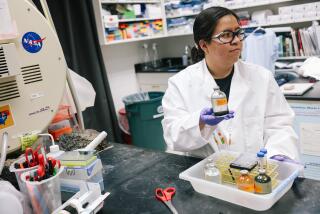Engineering’s Gender Gap : Cal Poly Nudges Girls Toward Science Fields
POMONA — To the casual observer, the classroom at Cal Poly Pomona may have appeared to be full of fun-loving high school girls making paper airplanes.
But a closer examination of the aerodynamic precision of their creations showed that these were no ordinary girls. Behind the occasional set of braces and the girlish blushes were the sharp minds of prospective engineers.
The girls had come to Cal Poly last week to take part in a six-day live-in learning session called “Exploring Engineering,” the only program of its kind in the state. They attended introductory engineering classes, talked to successful women engineers, slept in dormitories and got their first taste of college life.
Forty-three high school girls from the Los Angeles and Fresno areas attended the workshop, which is administered by Cal Poly’s minority engineering program as part of an effort to interest women and ethnic minorities in engineering careers.
Organizers said they hoped the airplane-making session would help whet the girls’ appetites for aerospace design, and that the program itself would acquaint bright high school girls with what engineers do and how to go about entering the field.
“There are very few women in engineering,” said Kay Hudspeth, director of Cal Poly’s minority engineering program. “Women are not encouraged to excel in math and science.”
Hudspeth said she is working to end male dominance in engineering, a field she said tends to be bound more tightly by tradition than others because it is more closely aligned with what she called the “conservative” power structure of American society. She said that social constraints placed on some women steer them away from technical ambitions.
The result, Hudspeth said, is that women account for only 13.9% of engineering bachelor’s degrees awarded in the United States.
“I heard one young woman say, ‘My parents give my brother all the airplanes and rockets,’ ” said a Cal Poly career guidance counselor.
Many of the girls disagreed, however, saying that they had not encountered such constraints in their lives.
“My mother suckered me into this,” said Laura McGruder, 15, a student at University High School in Los Angeles.
Although Laura had not decided by midweek whether she wanted to be an engineer, Suzanne Ruiz, 15, a high school student from Anaheim, had come to the workshop with a career in aerospace design firmly in mind.
“I just like space,” she said. “And my dad works for Rockwell.”
Each of the girls excels in math and science. Most had been told of the program by teachers who knew that their special talents and aptitudes met Cal Poly’s academic requirements for the workshop. Most paid a $125 fee, but some from low-income families received special scholarships to attend.
The week’s curriculum included experiments with chemicals, computers and water rockets, and lectures by successful women engineers who told the girls what to expect in the years ahead.
“When I was your age nobody told me to go ahead and do it,” said guest lecturer Eva Pantoja, a design engineer at General Dynamics in Pomona. “I did it because I’m stubborn and pig-headed and no one can tell me what to do anyway. My husband knows that.”
She admonished the girls to “stay in school and finish” and not to “make school a big social.”
The youngest of the girls at the workshop, Karleen Pendleton, 13, of Rosemead, confessed to experiencing at least a mild form of social constraint in an eighth-grade class at Muscatel Junior High School.
“In my algebra class all the boys said to me, ‘We’re smarter than you.’ When I beat them in the math competition they weren’t feeling too good,” she said.
More to Read
Sign up for Essential California
The most important California stories and recommendations in your inbox every morning.
You may occasionally receive promotional content from the Los Angeles Times.










